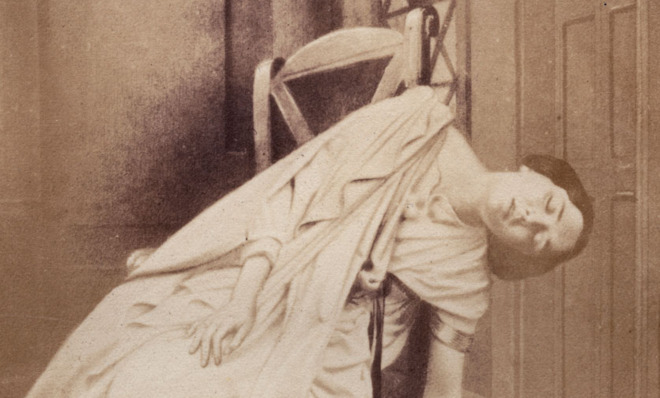21 fancy medical terms for mundane problems
Overdid it last night? Just explain to your boss that you've got a bit of veisalgia.


A free daily email with the biggest news stories of the day – and the best features from TheWeek.com
You are now subscribed
Your newsletter sign-up was successful
Your health issues might be mundane, but that's no reason to be boring. Give your complaints some interesting heft with these fancy medical terms for commonplace problems.
1. LIMB FALLING ASLEEP
That numb feeling that you wake to when you've slept on your arm wrong is obdormition. It is followed by a pricking, tingling sensation called paresthesia.
The Week
Escape your echo chamber. Get the facts behind the news, plus analysis from multiple perspectives.

Sign up for The Week's Free Newsletters
From our morning news briefing to a weekly Good News Newsletter, get the best of The Week delivered directly to your inbox.
From our morning news briefing to a weekly Good News Newsletter, get the best of The Week delivered directly to your inbox.
2. ICE CREAM HEADACHE
Sphenopalatine ganglioneuralgia. Say it five times fast to warm up your mouth and relieve the brain freeze.
3. MUSCLE TWITCH
If you ever feel the sudden flutter under your skin from a small bundle of muscle fibers spontaneously contracting, you can say you're experiencing fasciculation (from fasciculus, "little bundle").
A free daily email with the biggest news stories of the day – and the best features from TheWeek.com
4. CORN
That callus on your foot may be soft, in which case it's a heloma molle. If it's hard, it's a heloma durum.
5. TONGUE BUMP
One tiny, swollen taste bud looks like no big deal in the mirror, but feels distractingly humongous in your mouth. It has a big name to match that big feeling: transient lingual papillitis.
6. INGROWN TOENAIL
If you want to go Greek, it's onychocryptosis ("hidden nail"), but if you prefer Latin, stick with unguis incarnatus ("nail in flesh").
7. CANKER SORES
Aphthous stomatitis. Hard to say even without canker sores.
8. CHEEK BITING
You know how sometimes you bite the inside of your cheek by accident, and then you get that little ridge of tissue that sticks out so that you end up biting it again and again? That's morsicatio buccarum, baby.
9. GETTING THE WIND KNOCKED OUT OF YOU
This feels bad, but doesn't last very long. Just a transient diaphragmatic spasm.
10. HICCUP
The more rhythmic diaphragm action of the hiccup is a synchronous diaphragmatic flutter.
11. SNEEZE
Why sneeze when you can sternutate?
12. EYE FLOATERS
What are those little transparent threads you can see floating across your eyeball when you pay close attention? Just muscae volitantes ("flying flies") the name for the little bits of protein or other material in the jelly inside your eye.
13. BED WETTING
If you wet the bed at night it's nocturnal enuresis. If you have accidents during the day it's diurnal enuresis.
14. FAINTING
If you faint at the sight of blood or upon hearing some shocking news, it's probably vasovagal syncope, an automatic response mediated by the vagus nerve. Tightly laced corsets only make it worse.
15. DIZZY FROM STANDING UP FAST
If a dizzy, head rush feeling is brought on by standing up too fast, it's orthostatic hypotension.
16. GROWLING STOMACH
All that rumbling and gurgling in the stomach and guts goes by the name borborygmi.
17. GOOSE BUMPS
The Latin horrere originally referred to bristling, or hair standing on end, a sense captured by the word for goose bumps, horripilation.
18. NOSE RUNNING FROM EATING SPICY FOOD
When you're sniffling while you're spooning in that spicy soup, you've got gustatory rhinitis.
19. JOINTS MAKING NOISE
All that popping, creaking, and cracking of joints when you get out of bed in the morning goes by the name of crepitus, from the Latin for "rattle, crack." The word decrepit goes back to the same root.
20. SHIN SPLINTS
People aren't very impressed by shin splints, but they might be impressed by medial tibial stress syndrome.
21. HANGOVER
Overdid it last night? Just explain to your boss that you've got a bit of veisalgia. This fancy word for hangover was coined in a 2000 paper in a medical journal. It combines the Norwegian word kveis ("uneasiness following debauchery") with the Greek word for pain.
Arika Okrent is editor-at-large at TheWeek.com and a frequent contributor to Mental Floss. She is the author of In the Land of Invented Languages, a history of the attempt to build a better language. She holds a doctorate in linguistics and a first-level certification in Klingon. Follow her on Twitter.
-
 How the FCC’s ‘equal time’ rule works
How the FCC’s ‘equal time’ rule worksIn the Spotlight The law is at the heart of the Colbert-CBS conflict
-
 What is the endgame in the DHS shutdown?
What is the endgame in the DHS shutdown?Today’s Big Question Democrats want to rein in ICE’s immigration crackdown
-
 ‘Poor time management isn’t just an inconvenience’
‘Poor time management isn’t just an inconvenience’Instant Opinion Opinion, comment and editorials of the day
